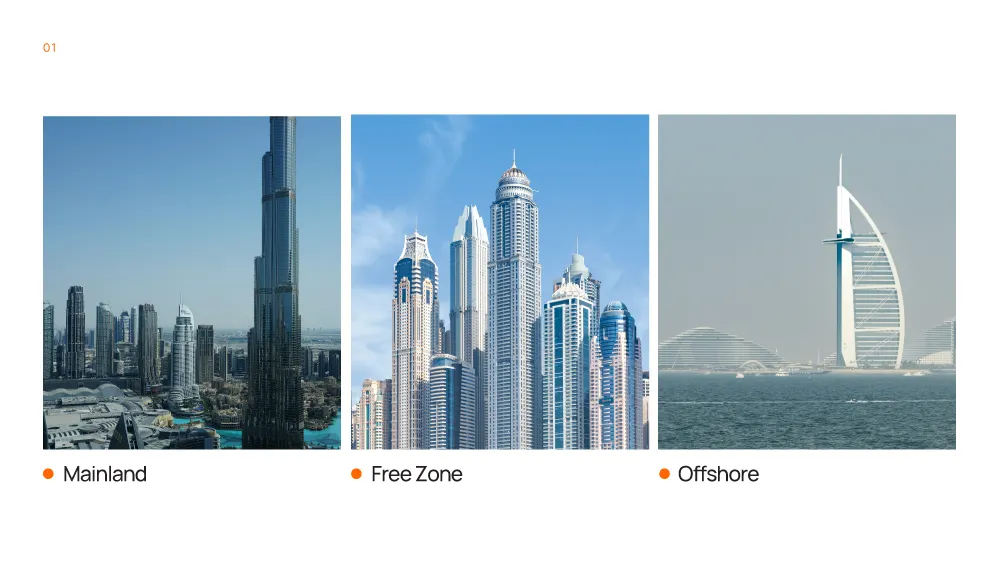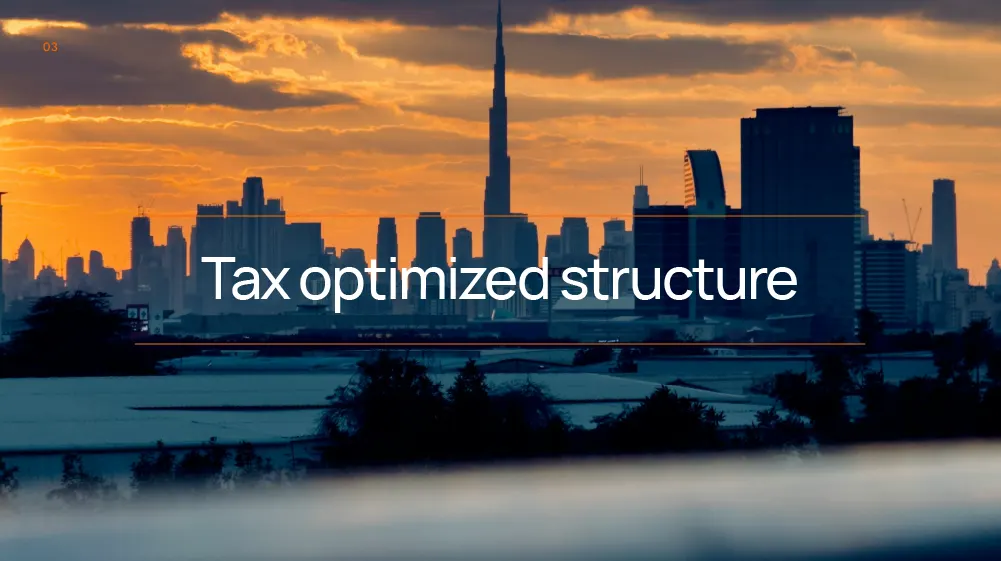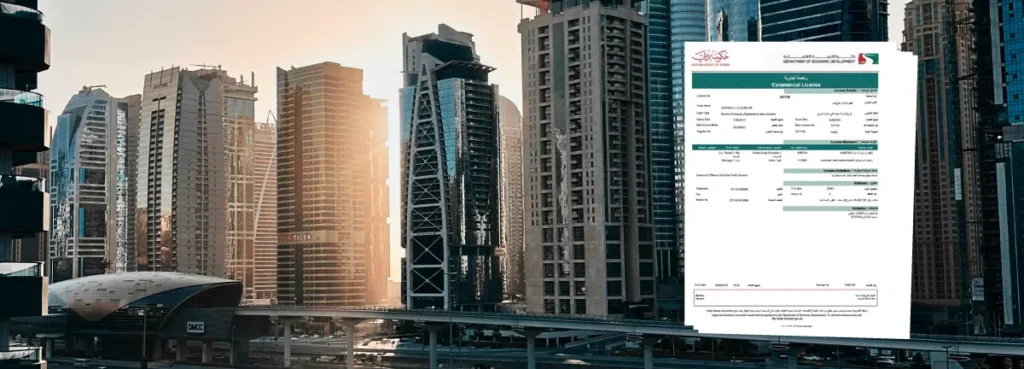Dubai has emerged as one of the most attractive destinations for entrepreneurs and global businesses alike. Its business-friendly policies, world-class infrastructure, and tax advantages make it a leading hub in the Middle East. However, before starting operations, it’s crucial to understand the legal structure and the various types of business licenses in Dubai.
This blog serves as a complete guide for entrepreneurs planning to start a business in Dubai in 2025. We’ll walk you through the legal framework, help you understand your options between Mainland, Free Zone, and Offshore setups, and give you a comprehensive breakdown of the types of business licenses in Dubai. You’ll also learn how to choose the right license, the steps involved in securing it, and how to structure your setup to optimize taxes and avoid common pitfalls.
Table of Contents
Understanding the Legal Framework
The business environment in Dubai continues to be governed by the UAE Commercial Companies Law (Federal Decree-Law No. 32 of 2021), as well as updated regulations from the Dubai Department of Economy and Tourism (DET) and the individual Free Zone authorities. All businesses operating within Dubai must be licensed under one of the officially recognized types of business licenses in Dubai.
A critical element of this legal framework is the requirement to operate under a legal entity. Entrepreneurs must decide whether to set up as a Sole Establishment, Limited Liability Company (LLC), Civil Company, Branch Office, or other approved forms depending on the jurisdiction. The legal form influences not only the operational scope but also taxation, liability, and regulatory obligations.
Recent reforms allow for 100% foreign ownership across most sectors in Mainland Dubai, eliminating the previous requirement for a local Emirati sponsor in many cases. This change has made Dubai significantly more attractive to international investors, especially in commercial, industrial, and professional services sectors. However, some strategic sectors may still require local participation or special approvals.
Additionally, all entities must comply with broader UAE regulations, including:
- Anti-Money Laundering (AML) and Combating the Financing of Terrorism (CFT) regulations, overseen by the UAE Central Bank and Ministry of Economy.
- Ultimate Beneficial Ownership (UBO) disclosure requirements.
- Economic Substance Regulations (ESR) for businesses engaged in geographically mobile activities.
- Corporate Tax compliance, particularly with the new federal tax regime introduced in 2023. Learn more about corporate tax registration in the UAE and how it aligns with your licensing strategy
Understanding these legal requirements is essential when choosing among the various types of business licenses in Dubai. The license you select will dictate what activities your business can legally perform, your regulatory responsibilities, and your long-term strategic flexibility within the UAE market.
Mainland vs Free Zone vs Offshore: Where Should You Register?

Before diving into the types of business licenses in Dubai, it’s important to understand where you should register your company. Your jurisdiction—whether Mainland, Free Zone, or Offshore—directly affects which types of business licenses in Dubai you’ll be eligible for, as well as the operational scope and benefits tied to each.
1. Mainland
Businesses registered on the Mainland are licensed by the Dubai Department of Economy and Tourism (DET). These businesses can operate anywhere within the UAE and are allowed to work directly with the local market. Mainland licenses—one of the most common types of license in UAE—are ideal for those looking to bid for government contracts or set up retail outlets across Dubai.
2. Free Zone
Dubai has over 30 Free Zones, each catering to specific industries such as media, technology, logistics, healthcare, and finance. Free Zone businesses enjoy full foreign ownership, customs duty exemptions, and streamlined setup processes. However, these businesses are typically restricted from directly trading within the UAE market without a local distributor.
3. Offshore
Offshore structures are typically used for international operations, asset protection, and holding companies. Though not permitted to operate within the UAE or maintain a physical presence, offshore businesses still fall under unique types of business licenses in Dubai, especially in jurisdictions like JAFZA Offshore and RAK ICC. These licenses support activities such as global investments, IP ownership, and cross-border transactions.
Business license types in Dubai depend on whether you choose a Free Zone or Mainland setup. Not sure which is right for you? Read our guide on Free Zone vs Mainland Dubai.
The 7+ Types of Business Licenses in Dubai
Understanding the different types of business licenses in Dubai is crucial for ensuring compliance with local regulations and choosing the right setup for your business activities. Each license aligns with specific industries and business functions, and as of 2025, the following are the most widely issued types of business licenses in Dubai across various jurisdictions:
1. Commercial License
This is one of the most common types of business licenses in Dubai, issued to businesses engaged in buying, selling, or trading goods. Whether you’re dealing in fashion, electronics, or building materials, the commercial license is a staple for trading businesses.
2. Industrial License
Among the types of business licenses in Dubai, the industrial license is essential for businesses involved in manufacturing, processing, or assembling goods. It’s typically issued to companies operating in designated industrial zones and working with raw materials or production lines.
3. Professional License
This license is intended for service providers, consultants, and artisans. Professions such as IT service providers, digital marketing agencies, legal consultants, and management advisors fall under this category. Among all types of business licenses in Dubai, this is often the go-to for freelancers and small consultancies. If you’re planning to offer HR services, securing an HR consultancy license in Dubai is a straightforward path to operate legally and tap into a growing market.
4. Tourism License
A must-have for businesses in the travel and hospitality sector, this license is regulated by the Department of Economy and Tourism. Tour operators, travel agencies, and hotels fall under this category, which is one of the more specialized types of business licenses in Dubai.
5. Freelance Permit
While not a traditional company license, the freelance permit is still one of the newer types of business licenses in Dubai. It allows individuals to legally operate as solo professionals in fields such as content creation, design, and consultancy, especially within Free Zones.
6. Agricultural License
For businesses engaged in farming, greenhouse cultivation, or livestock activities, this license is a must. It’s a niche but important part of the full spectrum of types of business licenses in Dubai, supporting the UAE’s push for food sustainability and innovation in agri-tech.
7. Craftsmanship License
Carpenters, electricians, plumbers, and mechanics fall under this category. This is one of the types of business licenses in Dubai designed to support skilled trades and small service-based operations.
8. E-commerce License
As online business continues to grow, the e-commerce license has emerged as one of the fastest-growing types of business licenses in Dubai. It enables businesses to sell goods or services online locally and internationally, with flexible options across various Free Zones and mainland jurisdictions. Learn more about obtaining an E-Commerce License in Dubai.
Understanding the distinctions between these types of business licenses in Dubai will help you align your business structure with long-term operational goals.
What Is a Commercial License in Dubai and Who Needs It?
A commercial license in Dubai is essential for businesses engaged in trading activities. This includes buying and selling goods, import-export, general trading, retail outlets, logistics companies, and even e-commerce platforms. If your business involves the movement or sale of physical products, a commercial license in Dubai is typically the correct category.
One of the key advantages of obtaining a commercial license in Dubai is flexibility. Companies can operate within the UAE and abroad, open multiple branches, and access a wide range of commercial opportunities. This license is available in both Mainland and Free Zones, giving investors options based on their market entry strategy.
Additionally, a commercial license in Dubai enables the business to sponsor employees, lease office space, and participate in public and private tenders. It’s a strategic choice for entrepreneurs looking to scale operations in regional and global markets.
Understanding the Purpose of a Professional License in Dubai
A professional license in Dubai is tailored for individuals and firms offering services that rely on intellectual effort or specialized skills. Examples include consultancy services, legal and accounting firms, IT and tech development, education, healthcare, and creative industries like design or content creation.
What makes a professional license in Dubai particularly attractive is the option for full foreign ownership in many cases—especially within the Mainland. Instead of a local shareholder, businesses can appoint a local service agent (LSA), who has no equity in the company. This allows professionals to retain full control of their operations while meeting local regulatory requirements.
A professional license in Dubai is often the preferred choice for freelancers, experts, and entrepreneurs delivering services directly to clients. It also offers the ability to sponsor staff and secure office space, providing a foundation for long-term business growth in the UAE.
How to Choose the Right License for Your Business

Choosing the right business license in Dubai depends on several factors: your business activity, target market, ownership structure, and long-term goals.
Below is a simple framework to help you decide the right business license for your business in dubai:
- Define Your Core Activity: Start by clearly identifying your business activity. The DET and Free Zone authorities provide categorized lists of permitted activities, each tied to specific types of license in UAE that determine what you’re legally allowed to do.
- Select Your Jurisdiction: Based on your market focus (UAE market vs. international), choose between Mainland, Free Zone, or Offshore. Each region supports different types of license in UAE, offering unique advantages based on your business goals.
- Decide on Ownership and Scale: If you want 100% ownership and limited local engagement, Free Zone may be suitable. If you want to scale within the UAE, a Mainland license may be better.
- Evaluate Licensing Authority Rules: Each Free Zone has its own rules for issuing different types of business licenses in Dubai. Match your activity with a zone that caters to your niche.
Ultimately, the right license is the one that aligns with your operational, legal, and financial strategy.
Step-by-Step Guide to Getting Your Business License in 2025
Securing one of the various types of business licenses in Dubai involves a structured process. While exact steps may vary by jurisdiction, here’s a general breakdown for 2025 to help you navigate the different types of business licenses in Dubai more efficiently:
1. Determine Business Activity
You must first choose your business activity from the official list. Each license type supports specific activities.
2. Choose a Legal Structure
You need to decide which legal structure you need to choose. Whether you’re setting up as a sole proprietorship, LLC, branch office, or other legal entity.
3. Select Jurisdiction
Decide between Mainland, Free Zone, or Offshore, based on your business model.
4. Reserve Trade Name
Submit your company name to the appropriate authority for approval. You need to make sure your trade name is also compliant.
5. Apply for Initial Approval
This grants you preliminary permission to proceed with the business setup and obtain your trade license.
6. Lease Office Space
Every business must have a registered address. Most Free Zones offer flexi-desk options.
7. Submit Final Application
Submit all legal documents, tenancy contract, and approvals to the licensing authority.
8. Receive License and Register with Authorities
Once approved, you’ll receive your official license. Mainland businesses must also register with the Ministry of Human Resources and Emiratisation.
Following these steps helps ensure compliance while applying for the types of business licenses in Dubai. It also lays a strong foundation for anyone researching how to start a business in Dubai, ensuring the process begins with the right license and legal structure
Choosing a Structure That Optimizes Taxes

The United Arab Emirates (UAE) introduced a federal corporate tax on business profits starting from financial years commencing on or after June 1, 2023. The standard corporate tax rate is set at 9% for taxable income exceeding AED 375,000, while profits up to this threshold are taxed at 0%, aiming to support small businesses and startups.
In addition, beginning January 1, 2025, the UAE will implement a 15% Domestic Minimum Top-up Tax (DMTT) on large multinational enterprises (MNEs) with consolidated global revenues of €750 million or more in at least two of the four financial years preceding the tax period. This measure aligns with the OECD’s global minimum corporate tax agreement, ensuring that substantial MNEs pay a minimum effective tax rate of 15% on profits in each country they operate.
It’s important to note that while Free Zone entities may benefit from a 0% corporate tax rate on qualifying income, they must meet specific criteria to maintain this status. These criteria include maintaining adequate substance within the UAE, deriving qualifying income, and complying with transfer pricing documentation requirements.
Choosing the right legal structure and understanding tax obligations are critical when applying for different types of business licenses in Dubai.
Common Mistakes to Avoid When Setting Up Your Business in Dubai
Starting a business in Dubai is straightforward when done correctly. However, many entrepreneurs make avoidable mistakes:
Selecting the Wrong License Type: Choosing the incorrect license for your activity is one of the most common mistakes when exploring the various types of business licenses in Dubai. It can lead to penalties or even business suspension.
Neglecting Jurisdiction Rules: Not understanding the limitations of Free Zones vs. Mainland can hinder growth.
Ignoring Visa and Labor Requirements: Failing to align your chosen license with the required visa allocations is another oversight. Some trade licenses in Dubai offer more flexibility in hiring, while others come with restrictions.
Underestimating Costs: Setup fees, license renewals, and mandatory office space can vary depending on the types of business licenses in Dubai. Many entrepreneurs miscalculate total expenses because they’re not familiar with these differences. You can read more about Dubai license costs which has been publish by our team of experts.
Incomplete Documentation: Every one of the types of business licenses in Dubai comes with its own set of paperwork. Inaccuracies or missing documents can delay approvals and add unnecessary stress.
Avoiding these mistakes ensures that your path to setting up your business and securing any of the types of business licenses in Dubai is smooth and legally compliant.
Staying Compliant: Renewals, Audits & Annual Reporting
To operate legally, all types of business licenses in Dubai must meet ongoing compliance standards including renewals, audits, and annual reports.
License Renewals
All types of business licenses in Dubai require annual renewal. This involves:
- Monitoring your license expiry date
- Submitting updated documents (Ejari, passport copies, approvals)
- Clearing outstanding fees or fines
- Applying through DED or your Free Zone authority
Late renewals can result in penalties or license suspension.
Mandatory Audits
Audit requirements vary by jurisdiction.
- Mainland businesses like LLCs must conduct annual audits under UAE law
- Free Zones such as DIFC require audited statements from approved firms
Audits are vital for transparency and regulatory compliance across all types of business licenses in Dubai.
Annual Reporting
Key obligations include:
- Corporate Tax returns (as per the new UAE tax laws)
- ESR filings for businesses in relevant sectors
- UBO disclosures to identify ultimate ownership
Staying compliant ensures your license stays active, and your operations stay uninterrupted.
GCG Structuring Provides Expert Solutions

Starting a business in Dubai requires more than just choosing a name and applying for a license. Entrepreneurs must navigate complex decisions like choosing the right jurisdiction, selecting from the various types of business licenses in Dubai, meeting regulatory requirements, and ensuring long-term compliance. Missteps during setup can lead to costly delays, rejected applications, or future legal and tax complications.
With over 5 years of experience, GCG Structuring offers end to end support for business setup in Dubai. From assessing the most suitable types of business licenses in Dubai to preparing documentation, securing approvals, and handling government liaison, we streamline the entire process for you. Whether you are registering in the Mainland, Free Zone, or Offshore, our experts ensure your business is structured correctly from day one.
If you’re looking to establish a business in Dubai and need professional guidance, tap the button below and book a call with us to take the first step towards success.
FAQ
1. 0 How do I decide which type of business license in Dubai is right for me?
The best way to choose among the types of business licenses in Dubai is to identify your core business activity. Whether you’re engaging in trading, offering professional services, or running a manufacturing operation, the license must align with the nature of your business activities.
2. 0 Are there any restrictions on foreign ownership in Dubai businesses?
In certain sectors, businesses in Dubai require a local sponsor or partner. However, in Free Zones, 100% foreign ownership is allowed. It’s important to research the requirements of the sector in which you plan to operate.
3. 0 How do the types of business licenses in Dubai differ from one another?
Each license type serves a different business activity. For example, a commercial license in Dubai allows for trading activities, while a professional license is for service-based businesses like consulting. It’s important to choose the license that aligns with your business goals and operations.
4. 0 What are the costs involved in obtaining a business license in Dubai?
The cost of obtaining one of the types of business licenses in Dubai can vary based on the jurisdiction, the size of the business, and the activities involved. Fees can range from AED 10,000 to AED 50,000 or more, depending on the license and additional setup requirements.
5. 0 How long does it take to obtain a business license in Dubai?
The process for obtaining most types of business licenses in Dubai can take anywhere from a few days to a few weeks. Factors such as documentation, approval processes, and jurisdiction can affect the timeline. Free Zone setups tend to be quicker due to streamlined procedures.





